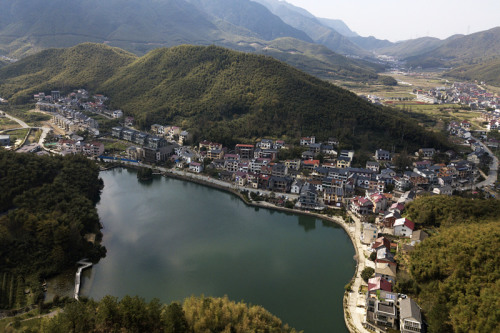
A bird's-eye view of Anji county, Huzhou city, Zhejiang Province, where President Xi Jinping proposed a new development method. (Photo/Xinhua)
Once, his fishing boat was Shen Bodong's entire world.
"I was born on a fishing boat and grew up as a fisherman. I used to have two boats, one for fishing and the other for living on," said the 52-year-old former fisherman who is Party secretary of Xiaomei village in Wuxing district, Huzhou city, Zhejiang province.
The city, which has a population of 3 million, sits on the southern bank of Lake Taihu, the third largest freshwater lake in China, straddling the provinces of Jiangsu and Zhejiang.
Covering about 2,250 square kilometers, the lake and its surrounding area have long been renowned for scenic landscapes and abundant aquatic resources-acclaimed as "the land teaming with fish and rice".
"Before 2007, we used to work, live and sleep on the boats-a tradition passed down through generations. Sometimes, we had trouble setting the dinner table when the wind blew, not to mention getting a sound sleep," Shen recalled, looking at a 2-meter-long wooden model of a fishing boat in the office of the village committee.
When heavy storms occurred, Shen and his peers had to secure their boats in the harbor and stay in hotels.
At the time, the water quality in the lake was extremely poor because all the fishermen's waste was discharged directly into the lake, posing a serious threat to the ecosystem and adding to the problem already posed by pollution caused by industrial wastewater pumped into the lake by nearby textile manufacturers and cement factories.
Shen's life changed in 2007, when his family, along with 257 other households, abandoned their boats and moved ashore in response to the local government's calls to better preserve the lake's ecosystem.
The relocation involved 1,067 people, with each person in a family entitled to a 25-square-meter apartment at a subsidized price of 870 yuan ($138) per square meter, which was extremely low even then.
"By 2011, we had all moved into apartments, with direct access to the sewage system linked to the urban sewage pipe network," Shen said.
However, the story of Shen and his peers is just a small part of the work undertaken by the Huzhou government to improve conditions in the southern part of Lake Taihu and provide long-term sustainable development that will not damage the ecosystem.
A cradle of change
Huzhou is the cradle of President Xi Jinping's "Two Mountains" theory-in which clear waters and lush mountains are invaluable assets, comparable to gold and silver mountains of legend. In August 2005, Xi, then Party secretary of Zhejiang, proposed the theory during an inspection tour of Yucun, a village in Huzhou's Anji county.
Since then, Xi has referred to the theory many times, both domestically and during overseas trips, to illustrate China's determination to improve environmental protection and widen green development efforts.
In May 2016, at the second United Nations Environment Assembly in Nairobi, Kenya, the United Nations Environmental Programme published a report-Green is Gold: The Strategy and Actions of China's Ecological Civilization-which examined China's attempts to build an "ecological civilization".
The report said China had made a number of notable achievements: For example, by the end of 2014, the country had built 10.5 billion square meters of energy-saving buildings in urban areas, accounting for about 38 per cent of the total area of urban residential buildings.
It added that as part of the attempt to build an ecological civilization, China would build on its success via a number of measures, including building a green manufacturing system that is efficient, clean, low carbon and circular.
"If China succeeds in achieving these goals, then it will have taken a major step towards shifting to a greener economy that uses resources more efficiently, limits the risks of climate change and improves the health of its people," said Achim Steiner, administrator of the UN Development Programme.


















































